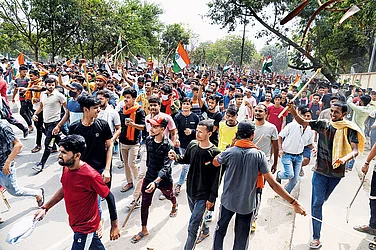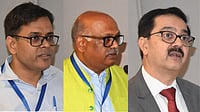For the Indian society, the concept of heteronormativity is a bubble—a comfort zone from which it is not ready to come out, says Rahul Upadhyay, founding director of Gandhinagar Queer Pride Foundation in Gandhinagar, Gujarat. According to Upadhyay, who identifies as non-binary, India was “never ready per se” to decriminalise homosexuality.
Last month, the Supreme Court reserved its verdict on cases seeking legal validation for same-sex marriages under the Special Marriage Act, 1954. The hearing of the cases began in March and concluded in May. Against this backdrop, Upadhyay’s observation commands a deeper discussion, particularly in the scenario where the apex court rules in favour of the petitioners.
Two years after the court read down Section 377 of the Indian Penal Code to decriminalise homosexual relationships in September 2018, a report, Queering the Law: Making Indian Laws LGBT+ Inclusive, commented on the difficulties that the community continued to face in accessing the rights given to them by the court. In its introduction to the chapter on identification documents, the report states, “Identity documents are essential for accessing an array of rights and benefits. But updating them can be very difficult, particularly for transgender persons. Procedures for doing so are complicated, and officials in the process may often discriminate against queer persons.”
For example, basic documents like the Aadhaar card, the PAN card and the passport require applicants to choose from either male, female or transgender. There is no place for other genders—there are 72 of them. Considering the fact that each of these government documents is processed by a separate department, the cost of amendments in terms of procedures, time and energy will be huge. And, this is just one of the several chapters in the manual.

Stuck in the Closet
The funny thing in India, says Upadhyay, is that people can get married to frogs, dogs and trees but not to people they love. Manvendra Singh Gohil, who is associated with the erstwhile princely state of Rajpipla in Gujarat in a titular capacity and LGBT rights activist, says, “Conferring same sex marriage rights on the LGBTQ+ community means giving basic human rights to them. These are fundamental rights provided by the Constitution, where all citizens of India—irrespective of their caste, creed, race, religion and sexual orientation—have equal rights to marry, love and live with loved ones.” Gohil came out as gay several years ago.
Talking about the challenges that the community faces, he says, “In the absence of a legal right to marry, we are not able to open joint bank accounts; we cannot have a nominee of our spouse and we cannot own properties together. We have no inheritance law in place.” Legalising same-sex marriages will give couples benefits like adoption rights, joint insurance policies, joint purchase of properties, joint bank accounts, inheritance rights, etc., Upadhyay points out.
However, recognising same-sex marriages as legal is a necessary, not sufficient, condition to give the community these rights. The Supreme Court has already made that clear. Gujarat High Court advocate Aaditya Bhatt, who is the co-founder of Bhatt and Joshi Associates, a full service law firm, says that the subject of inheritance is dealt with exclusively by the personal and family laws of different religions in India. “However, a problem arises in determining rightful ownership of such couples’ properties in case of succession,” he adds.
“While the Special Marriage Act, 1954 has created a feasible scope for succession, individuals are still hesitant to register under the act. This is because most religious segments in India give high importance to their respective personal laws of succession; and the prospect of giving it away compels them to disregard the act,” according to the firm.
During the hearing of the same-sex marriage cases, the Supreme Court bench observed that there were several statutes governing various rights consequential to marriage.
M.R. Shamshad, a Supreme Court advocate, says, “The Special Marriage Act is a way to facilitate the marriage of a heterosexual couple coming from different backgrounds, including religion. A Hindu, Jain, Buddhist and Sikh person will still not be deprived from the HUF [Hindu Undivided Family] status and succession of property. If this marriage is not a valid marriage as per Hindu Marriage Act, how will one resolve the issue of inheritance?”
Similarly, if Muslims or Christians marry under this act, their status for claiming succession from their parents will remain intact in view of the Caste Disabilities removal Act, 1850 despite the fact that inheritance in Muslims is governed by their personal laws and it prohibits such marriage. The challenge, however, will be to the inheritance rights of a partner in this marriage or their [the couple’s] adopted child, Shamshad observes.
Beyond inheritance, same-sex couples seek solution to other issues too but they may not get fortunate. “There are many issues that we are facing, especially those who are married and have their spouses out of country. They have a lot of difficulty in travelling to India. In the case of a heterosexual couple, the foreign spouse can get an OCI passport. But in our case, that is not allowed,” says Gohil, talking about the problem in getting overseas citizen of India papers.
Additionally, in certain cases, legally married couples in India can file taxes jointly, avail tax benefits by adjusting taxable assets between each other, get inheritance rights, medical insurance, disability and other social security benefits.
Power of Pink Economy
Another argument in favour of recognition to same-sex marriages is that it will boost pink economy, the business generated in the country by the LGBTQ+ community.
Prateek Raj, assistant professor of strategy at the Indian Institute of Management, Bangalore, says, “The pink economy is going to expand and become more salient in the 21st century, as queer people [are] more assertive about their freedoms today than before, with or without the legally sanctified freedoms.”
A paper, titled Pink Capitalism: Perspectives and Implications for Cultural Management by Lorenzo Yeh, states that the pink capitalism wave is intensifying and will influence local businesses. The digitalisation of business and social media is also affecting the field of pink capitalism which gives a number of business opportunities to LGBTQ in “virtual reality”.
Anjali Byce, chief human resource officer at Sterlite Technology Limited, says that LGBTQ+ consumers and allies represent a significant market segment. “By adopting an LGBTQ+ friendly office policy, companies can connect with this consumer base, build brand loyalty and tap into new market opportunities. Inclusive environments foster diverse perspectives and experiences, which can spark innovation and creativity,” she adds.
Niccolo Nitti, global head–people and organisation at Novartis Corporate Centers, says, “When individuals feel accepted and valued for who they are, they are more likely to experience higher job satisfaction, overall well-being and increased productivity.” The company claims to have supportive policies like gender-neutral parental leave and an inclusive insurance policy.

Is India Ready?
The path to ensuring LGBTQ+ rights will not be easy for the government or the corporates, as several amendments will have to be made at every step in a machinery that has rarely seen beyond the binary gender system.
However, the first step in this marathon will be acceptance, which itself is a huge challenge, says Upadhyay, who goes by the pronoun “they”, pointing to the discrimination that the community faces at all levels. “They are out of their homes as soon as they come out to their families. They are forced into heterosexual marriages and conversion therapy,” they say. But things have not been easy even outside the personal space.
There is no dearth of challenges before the community, according to Upadhyay. “Forget Section 377. The NALSA judgement came way before that [in 2014]. It gave transgenders the right to self-identify. But even today, they find it challenging to get changes made in their documents,” they say.
They also do not agree with claims of inclusion at workplaces. “No matter how much companies say they are non-discriminatory and inclusive, LGBTQ members face discrimination at a majority of these places. The people they have to work with are not sensitised and educated,” they lament.
And the discrimination is not restricted to private companies. “How many transgenders or openly queer people will you find in PSUs? Very few. The truth is that even after Section 377 was taken down, these work places are not at inclusive or supportive,” says Upadhyay, adding that finding rented accommodation and getting help from the police are other points on the list of nightmares.
“There have been a lot of instances where people from the queer community were bullied, robbed or blackmailed. When they want to reach out to the police, in most cases, the way they are treated in not at all supportive. They are victims, not culprits. So, rather than asking inappropriate questions, the department should focus on catching culprits,” says Upadhyay.
They are of the opinion that if same-sex marriage is legalised, there will not be much pressure of compliance on already inclusive companies.
Hoping for More
Geeta Luthra, senior advocate, who is representing one of the petitioners in the Supreme Court, says, “Though we have reached this stage of discourse about same sex marriages quite late, it is welcome.” One improvement that has happened is more people are coming out and talking about themselves, says Upadhyay.
Raj from IIM, Bangalore, observes that legal recognition of gender equality and women rights paved the way for women entering and participating in the mainstream of the global economy. “Similarly, recognition of queer rights will pave the way for the integration of queer people into the mainstream. Such integration is essential, and marriage equality is a necessary step in that integration,” he says.
Upadhyay too feels that legal validation of same-sex marriages can help increase the visibility of LGBTQ+ members. “When the verdict on Section 377 was given in 2018, a lot of people came out. We hope that, with a favourable same-sex marriage verdict, more homosexual couples can come out and talk about themselves, which is one of the best ways to normalise the concept of such marriages and improve the visibility of the queer community and same-sex partners,” they say.
According to them, the entire queer community is optimistic and hopeful that the SC bench “which seems very supportive and practical will give a judgment in our favour”. When the law is with them, there is some support system, says an optimistic Upadhyay.
However, if the community’s experiences after the Supreme Court verdicts on transgender rights and Section 377 are a yardstick, it will take much more than just the Apex court’s favour for them to get the rights that they seek. To put it in perspective, last time, the Central government had left the verdict on decriminalising homosexual union to the “wisdom of the court”. This time, it appears prepared to fight it out, asserting that it is the right of the legislature to pass a law in this regard “after consultations”.
The world dominated by black and white has been called upon to make space for rainbow colours. How willing is it to concede?
Input from Chitra Nair































